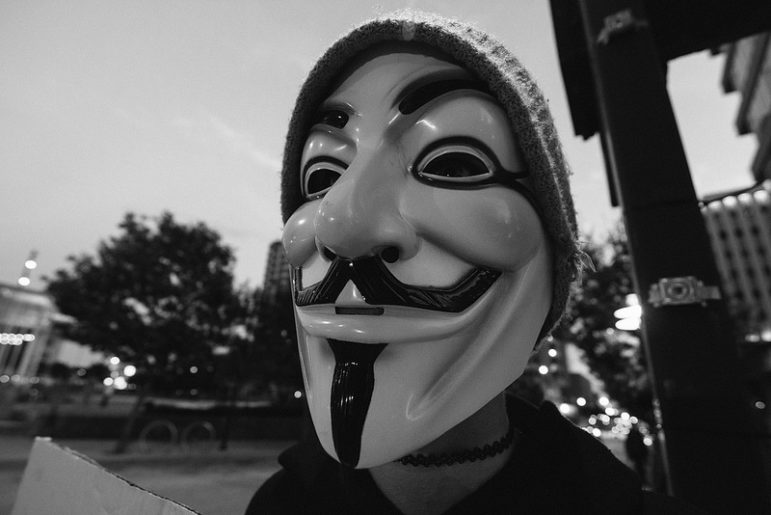
December 16, 2016; Slate
Despite protests and impassioned appeals, in the end, more electors defected from Hillary Clinton than from Donald Trump. Now that the popular vote and Electoral College votes have been tallied, it may fall to guerilla art, civil disobedience, rallies, vigils, marches, walkouts, and the many other tactics of witness and disruption to force voices of protest to be heard. For undocumented immigrants, students, and others who could not or did not vote and now oppose the new administration’s initiatives, protest can offer another opportunity to participate in civil society.
In “Lessons for Fighting a Demagogue, From the People Who Survived a Plague,” Michelle Goldberg, a columnist for Slate, offers encouragement and advice to the roiling anti-Trump protest movement emerging across the country that is outpacing the growth of the Tea Party movement following the election of Barack Obama in 2008.
Protests are being planned for the inauguration, such as the Women’s March on Washington. Women, African Americans, Muslim Americans, immigrant Americans, Jewish Americans, LGBT Americans, and many other Americans may find common cause in the months and years ahead. Experienced organizers and people new to social action can draw from the lessons of past movements. Goldberg takes a look at the rise and ultimate success of the ACT UP resistance movement that faced seemingly insurmountable odds.
When ACT UP formed in March 1987, the AIDS epidemic was six years old and had killed 40,000 people, yet President Ronald Reagan hadn’t given a single speech about it. That year the Senate, by a vote of 94-2, passed an amendment banning the Centers for Disease Control from funding AIDS programs that “promote, encourage or condone homosexual activities.” Introducing the amendment, North Carolina Sen. Jesse Helms said, “We have got to call a spade a spade, and a perverted human being a perverted human being.”
Relentless, radical, and pragmatic protest was required to confront the pharmaceutical company Burroughs Wellcome for charging $10,000 a year for AZT, the only known drug to be effective against the AIDS virus. At that time, homosexual acts were illegal in most states. Years of constant action were also required to force the government to expand the CDC’s definition of AIDS to include women and intravenous drug users as being among its victims.
Sign up for our free newsletters
Subscribe to NPQ's newsletters to have our top stories delivered directly to your inbox.
By signing up, you agree to our privacy policy and terms of use, and to receive messages from NPQ and our partners.
New movements have formed more recently, like Occupy and Black Lives Matter. Sometimes described as “not your grandfather’s civil rights movement,” a Black Lives Matter activist declined meeting with President Obama, saying she “could not, with any integrity, participate in such a sham that would only serve to legitimize the false narrative that the government is working to end police brutality and the institutional racism that fuels it.” That is new. What is also new is that BLM just hired the world’s fourth largest advertising agency network, J. Walter Thompson, to help advance its issues.
Going forward, protests will likely blend the old with the new, such as the “inside/outside” strategy of ACT UP (protesters outside and confederates inside who open the doors in more ways than one) combined with the use of ever-emerging technology to instantly mobilize people. Whatever comes, no one should be surprised by how long and hard the road will be.
Patti Smith sang an emotional rendition of Bob Dylan’s 1963 classic “A Hard Rain’s A-Gonna Fall” during the Nobel Prize for Literature presentation. Dylan’s words that may now join the canon of American protest songs speak to the “hard rain” that is sure to fall on those who put themselves in harm’s way for the sake of others and in fidelity to their sense of justice. Amanda Petrasich for the New Yorker described the song’s second verse, at which point Patti paused and had to begin again, as expressing “a dystopian nightmare state, a landscape ravaged by surreal despair.” But this song also speaks to human resilience in the face of profound suffering. Sung before Swedish Royals and many other prominent guests assembled in Oslo City Hall, this is the kind of action, speaking out against injustice, that Dylan honors with his music and that history remembers long after elected leaders pass from the stage.
One thing ACT UP veterans insist on is the importance of real-world, offline organizing to figure out a new strategy. “It is messy and it is slow and I have faith that we will get there,” Alexis Danzig, who joined ACT UP in 1988, told me after the second Trump Resistance meeting. “People just have to bear with each other. Last night was a gathering of like-minded people who know that something needs to happen. Some of them are younger activists who have never faced a government that has so actively hated them. Others of us are kind of used to being hated because of who we are.”
—James Schaffer













